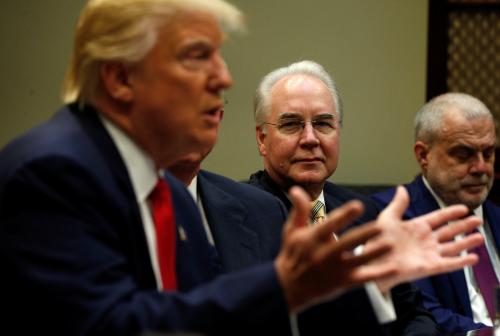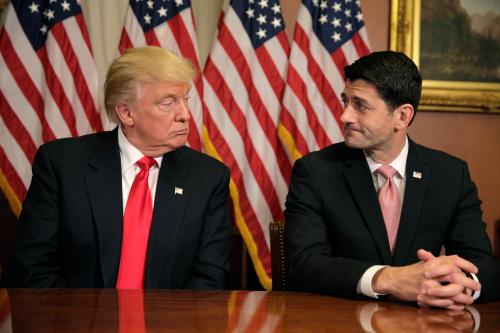This article originally appeared in the New York Daily News on March 30, 2017.
“When the going gets tough, the tough get going,” according to the old saying. When the American Health Care Act failed last Friday, the going got pretty tough for the Trump administration. Rather than showing grit, however, President Trump pouted. Let Obamacare explode, he tweeted, then the Democrats will come to us.
For at least four reasons, this attitude is, to use a favorite Trump expression, “so sad.”
First, despite some genuine problems, the Affordable Care Act is mostly working quite well. Second, far from solving the problems of Obamacare, the Republicans’ AHCA would have made them worse.
Third, real leaders don’t run away from problems; they fix them. Fourth and most important, a compromise plan could have appealed to — and could still appeal to — enough members of both parties to pass.
Republicans insist that Obamacare is failing. Facts refute the charge. The law set out to expand health insurance coverage, and it has done so — by more than 20 million people. Overall health care spending since enactment of Obamacare has been well below historical trends. Commonly reported measures of health care quality have been improving.
To be sure, the law has its problems. Obamacare leaves some people with burdensome health insurance costs. Too few insurers offer plans in some areas.
To be sure, the law has its problems. Obamacare leaves some people with burdensome health insurance costs. Too few insurers offer plans in some areas.
The AHCA would have made the first problem worse and done little to solve the second. It would have ended Medicaid for millions of poor people, and raised premiums for individuals and small groups by as much as 20%. It would have slashed help for people in their 50s and 60s.
It would have used the savings from these cuts to finance tax reductions for the well-to-do and to pay for premium subsidies for people with incomes as high as $200,000 a year, most of whom can afford to buy health insurance on their own if they are not covered through work.
The problems of insurers are more complicated. Through inexperience or the desire to attract customers, some insurers initially set premiums so low that they lost money. Unsurprisingly, they then either raised prices or stopped selling in the Obamacare marketplaces.
Those drafting Obamacare foresaw such difficulties and authorized payments to insurers that enrolled sicker-than-average customers. The Republican-controlled Congress reneged on that commitment.
Unwilling to take responsibility for problems they helped create, Republican critics now allege that insurance prices are excessive and that marketplaces are collapsing.
Both charges are false. Premiums are lower, not higher, than projected before Obamacare passed. And independent analysts now agree that after the price adjustments, insurance markets will be stable and that insurers will make money.
Trump and Republicans should devote themselves to correcting acknowledged flaws in Obamacare, not to sabotaging it. Many of these improvements would advance Republican objectives and help politically red states:
- The Obamacare mandate that large-and medium-sized employers provide insurance to workers applies only to workers employed 30 or more hours a week. Republicans correctly criticized the design of this mandate. It should be improved or repealed.
- Some Republicans have proposed replacing the 40% excise tax on high-cost health plans, the so-called Cadillac tax, with a requirement that people include the cost of employer-financed health insurance above certain thresholds in their personal taxable income. Democrats should welcome that shift.
- Nineteen states have been unwilling to extend Medicaid coverage, partly from a fear that the federal government will cut payments and leave states holding the bag. Congress should reassure states on this score. It would help all states, most of which are Republican-controlled.
- Republicans and some Democrats have decried the provision of Obamacare authorizing the creation of the Independent Payment Advisory Board, an unelected group empowered to hold down growth of Medicare spending by proposing cost-reducing changes that would take effect unless both houses of Congress mustered majorities to block them. So, change it.
Should the GOP move ahead on these repairs, Democrats would want something in return. For instance, they would seek to raise, rather than lower, assistance for those who currently face high out-of-pocket medical costs. But that’s the kind of tradeoff Donald Trump, supposed dealmaker, should proudly strike — isn’t it?
There is a deep irony here. Medicaid, which Republicans now seek to roll back, was originally a Republican proposal. The Obamacare marketplaces, the requirement that individuals carry insurance, and subsidies to help them afford it were originally Republican ideas.
Republicans now fail to acknowledge clear-cut evidence that these ideas are working and refuse to consider changes that would make them work even better. So sad.
The Brookings Institution is committed to quality, independence, and impact.
We are supported by a diverse array of funders. In line with our values and policies, each Brookings publication represents the sole views of its author(s).









Commentary
Op-edWant to fix Obamacare? Here’s how
March 30, 2017